Items
Site
The Medicine Chest
keywords is exactly
colonisation
-

Seeds of Change
"'Seeds of Change' is an ongoing investigation based on original research of ballast flora in the port cities of Europe. Projects have been developed for Marseilles, Reposaari, Dunkirk, Exeter and Topsham, Liverpool and Bristol. Material such as stones, earth, sand, wood, bricks and whatever else was economically expedient was used as ballast to stabilize merchant sailing ships according to the weight of the cargo. Upon arrival in port, the ballast was unloaded, carrying with it seeds native to the area where it had been collected. The source of these seeds can be any of the ports and regions (and their regional trading partners) involved in trade with Europe. The botanist, Dr. Heli Jutila, an expert on ballast flora writes, 'Although seeds seem to be dead, they are in fact alive and can remain vital in soil for decades, and even hundreds of years in a state of dormancy'. Seeds contained in ballast soil may germinate and grow, potentially bearing witness to a far more complex narrative of world history than is usually presented by orthodox accounts" (Alves 2021). -
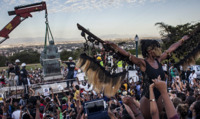
Chapunga - The day Rhodes fell
The character Msezane is portraying depicts the statue of the Zimbabwe bird that was wrongfully appropriated from Great Zimbabwe by the British colonialist Cecil Rhodes. It currently sits in his Groote Schuur estate. -
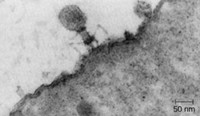
Holes
A virus attacks a cell by attaching itself to the outer wall. It then uses a specialized protein to digest a small hole in the wall of the cell and inject its nucleic acid molecule into the cell's cytoplasm. -
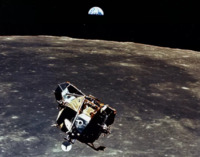
Moon landing
"FIZZY LIFTING DRINKS, it said on the next door. ‘Oh, those are fabulous!’ cried Mr Wonka. ‘They fill you with bubbles, and the bubbles are full of a special kind of gas, and this gas is so terrifically lifting that it lifts you right off the ground just like a balloon, and up you go until your head hits the ceiling – and there you stay.’ ‘But how do you come down again?’ asked little Charlie. ‘You do a burp, of course,’ said Mr Wonka. ‘You do a great big long rude burp, and up comes the gas and down comes you! But don’t drink it outdoors! There’s no knowing how high up you’ll be carried if you do that. I gave some to an old Oompa-Loompa once out in the backyard and he went up and up and disappeared out of sight! It was very sad. I never saw him again.’ ‘He should have burped,’ Charlie said. ‘Of course he should have burped,’ said Mr Wonka. ‘I stood there shouting, “Burp, you silly ass, burp, or you’ll never come down again!” But he didn’t or couldn’t or wouldn’t, I don’t know which. Maybe he was too polite. He must be on the moon by now’” (Dahl 1974: 95). -
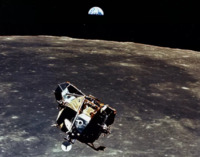
The Eagle has landed (Apollo 11 Lunar Module Ascent Stage Photographed from Command Module)
The Apollo 11 Lunar Module ascent stage, with Astronauts Neil A. Armstrong and Edwin E. Aldrin Jr. aboard, is photographed from the Command and Service Modules (CSM) during rendezvous in lunar orbit. The Lunar Module (LM) was making its docking approach to the CSM. Astronaut Michael Collins remained with the CSM in lunar orbit while the other two crewmen explored the lunar surface. The large, dark-colored area in the background is Smyth's Sea, centered at 85 degrees east longitude and 2 degrees south latitude on the lunar surface (nearside). This view looks west. The Earth rises above the lunar horizon. -
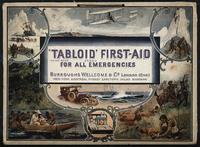
Situations in which a Tabloid medicine chest made by BWC would be useful.
Situations in which a Tabloid medicine chest made by Burroughs Wellcome and Co. would be useful. Colour process print, ca. 1909. The Tabloid medicine chests were distributed free to well known explorers such as H.M Stanley and Ernest Shackleton. The word 'tabloid' was coined by the firm of Burroughs Wellcome and registered as a trademark.


